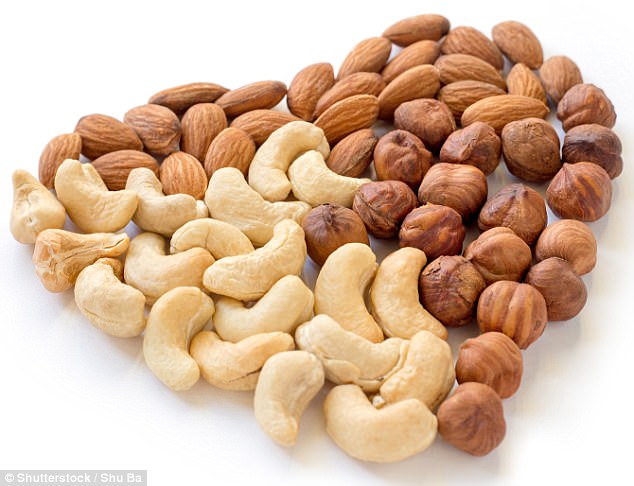- A Harvard study of more than 200,000 people found all nuts improve heart health
- Despite the high calorie count, they found no clear evidence that nuts drastically trigger weight gain
- Peanuts (technically a legume) and walnuts also lowered the risk of stroke
Eating a handful of nuts twice a week can slash the risk of heart disease by almost a quarter, say scientists.
A study of more than 200,000 people – many of whom were followed for more than three decades – found all types of nuts helped prevent the world’s biggest killer.
Strikingly, the Harvard University researchers said they also found no evidence that nuts fueled weight gain, despite their high calorie content and previous reports to the contrary.
Regular snacking on walnuts, almonds, hazelnuts, cashews, pistachios, pecans and peanuts achieved dramatic results compared to those who rarely or never ate them.
Those who ate any of these tree nuts two or more times a week were 23 and 15 percent less likely to develop coronary heart disease or cardiovascular disease, respectively.
The same amount of peanuts – which strictly speaking are a legume – also reduced the risk of the conditions by 15 and 13 percent, respectively.
Eating walnuts one or more times per week reduced coronary heart disease and cardiovascular disease risk by 21 and 19 percent, respectively.
Nuts have long been regarded a ‘superfood’ as they are high in antioxidants, proteins, nutrients, minerals and fiber.
The latest study is the biggest and longest running of its kind.
Along with heart disease they have been found to protect against a host of serious illnesses including cancer, diabetes, respiratory conditions and dementia.
Lead author Dr Marta Guasch-Ferre, a nutritionist at Harvard University in Boston, said: ‘Our findings support recommendations of increasing the intake of a variety of nuts, as part of healthy dietary patterns, to reduce the risk of chronic disease in the general populations.’
Her large-scale analysis showed a consistent link between the quantities of nuts consumed and cardiovascular disease and coronary heart disease.
Those who ate five or more servings of nuts a week had a 14 percent lower risk of cardiovascular disease and a 20 percent lower risk of coronary heart disease.
The results were similar for tree nuts – which also include macadamias, Brazil nuts and chestnuts – and peanuts individually.
Eating peanuts and walnuts was also found to reduce the risk of stroke.
The study published in the Journal of the American College of Cardiology said recent dietary recommendations have shifted towards including higher quantities of nuts.
This is due to their unique nutritional composition reducing risk factors for cardiovascular disease.
Peanuts were included because they have a similar fatty acid and nutrient profile.



















































